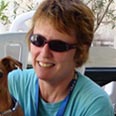
Murder survivor: I still have flashbacks
Tour guide Kaye Susan Wilson stabbed her assailant with pocketknife before being gravely injured herself. DNA sample of blood stains led to arrest of Palestinian cell responsible for last year's murder of Neta Sorek as well. 'She believed in co-existence and studied Arabic,' says brother in pain
The arrest of the Palestinian cell responsible for the murder of American tourist Kristine Luken and the attempted murder of tour guide Kaye Susan Wilson in a forest near Jerusalem last month, was largely made possible thanks to Wilson's resourcefulness.
After the gang's arrest was made public, Wilson told one of her friends that she still "had flashbacks from the incident."
The police on Wednesday released for publication that eight Palestinian cell members were arrested for a series of offenses, including the murder of Luken.
Wilson told Shabak investigators that she noticed the two murderers approaching, and told her friend, "They have a plan."
Wilson tried to convince the men that they weren't Jewish, but one of them "grabbed the Star of David around my neck and said in Arabic 'What's this?'," she recalled.
The tour guide told detectives the suspect "took the necklace off and put it in his pocket."
The two women begged Iyad Patpata and Kifah Ghanimat, who both confessed to the murder, to spare their lived – but the men proceeded to stab them.
Before being seriously injured, Kaye managed to stab Ghanimat with a pocketknife she had in her possession. His blood stains, which were used to produce DNA samples, were the main piece of evidence that helped solve the case and arrest the suspects.
When Wilson realized her friend was in critical condition, she pretended to be dead and waited for the assailants to leave. She walked away from the site barefoot, with hear hands tied, and in serious condition.
"I tried to get up three times and fell down, I deviated from the path and couldn't find my way, and it was very difficult for me to breathe, but I had to make a switch in my head and think positive," she told the investigators.
Searched for body themselves
During investigation, the cell members confessed to Luken's murder, as well as to the murder of Neta Sorek of Zichron Yaacov, whose body was found last February near the Beit Jamal Monastery outside Jerusalem.
At first the police thought Sorek had committed suicide, but later came to the conclusion that she had been murdered.
Sorek's family was relieved by the news of the arrest. In a conversation with Ynet, Neta's brother Eran said, "From the very first moment we knew it was murder. There was not a chance she would put an end to her own life."

'Didn't take her own life.' Neta's brother, Eran (Photo: Avihu Shapira)
Neta's family painfully noted that she believed in co-existence, studied Arabic, and met with Arab women from villages in northern Israel.
Her brother criticized the police immediately following the incident: "We knew Neta went to Beit Jamal, and we were informed a few hours later that she did not return to the place where she was staying, and that she was missing.
"Unfortunately, the investigation was conducted amateurishly by police officers at the Beit Shemesh station," he lamented.
When Neta's family realized that not enough efforts were being exerted to locate their loved one, they began searching for her themselves.
"Eventually my cousin and two friends located the body," recalled the brother, "It wasn't so hard. They just thought – where would a person who had only an hour to walk around before dark go, calculated the distances and found the body."
'Evidence destroyed'
Neta's family agreed to conduct an autopsy, and results showed her death was caused as a result of foul play and not suicide, as previously suspected.
From that moment, a new investigation team from the Jerusalem district police was appointed to find Neta's murderers.
"The new team had difficulty at the beginning because some of the evidence had been destroyed, but they managed to collect threads that were released for publication today," he said.
Eran noted his older sister accompanied him throughout his life. "We grew up together at Kibbutz Afikim, and had a wonderful childhood along with our younger brother Noam," he noted in pain.
"Neta loved nature, and devoted an hour and a half every day to walking outdoors. She never walked along roads or pathways," he noted.
"After the army," the brother recalled, "she moved to Sweden and then to the United States, but after two decades abroad she came back to Israel and married Amotz, with whom she had a daughter."
Neta was murdered last February, shortly before her brother Noam's planned trip to Israel, in order to celebrate his 40th birthday.
"Instead of a celebration, he arrived for the funeral," said Eran. "My grandfather said that we make plans, while God is laughing from above."
Hagai Einav contributed to this report
- Follow Ynetnews on Facebook










